The close-grip bench press is a fun twist on the classic barbell bench press. In this version, you’ll place your hands closer together on the bar (typically around shoulder-width apart or slightly narrower).
This narrower grip shifts the focus on the inner chest to the triceps muscles.
As the grip gets narrower, the triceps brachii becomes more dominant in extending the elbow to complete the lift.
Because of this, it is a popular exercise among bodybuilders and strength athletes who want to build tricep strength and size.
A study has also shown that this narrower grip shifts the emphasis more towards the triceps brachii and less on the pectoralis major and shoulder compared to the traditional bench press.
Want to take your gains to the next level? Discover your daily calorie needs with our free TDEE calculator
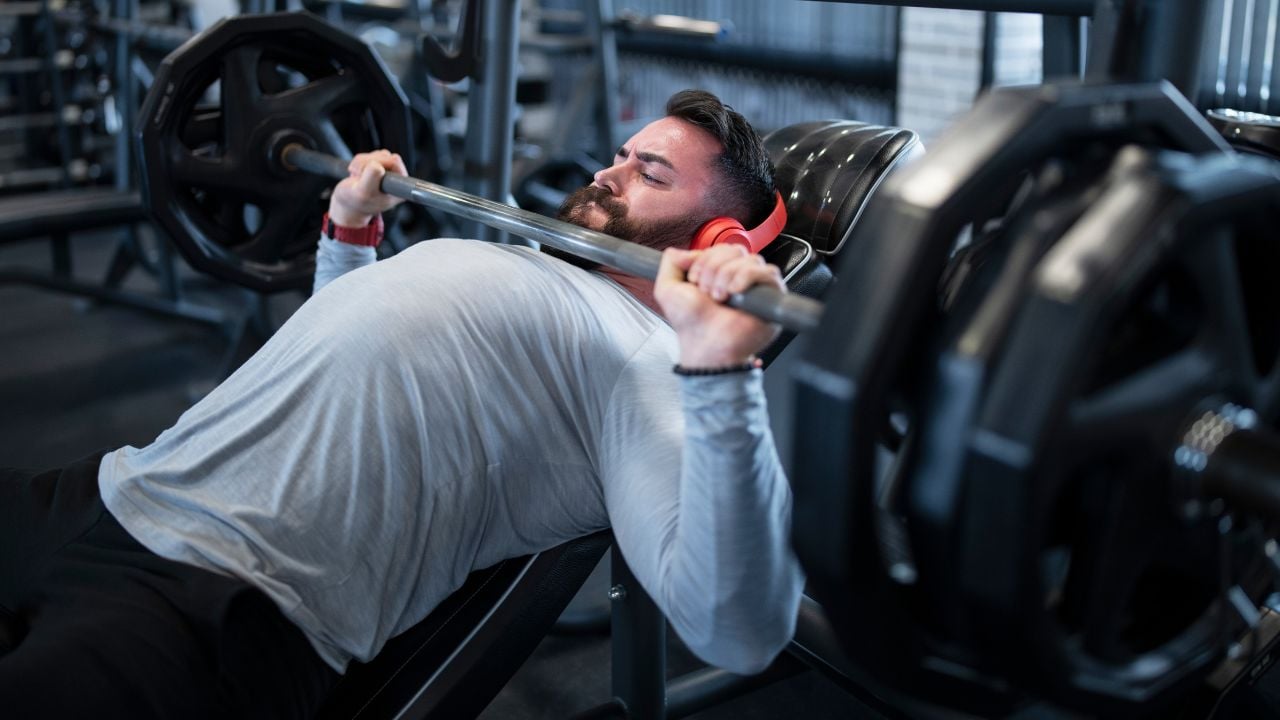
Close Grip Bench Press Muscles Worked
The close-grip barbell press primarily works the tricep muscles and chest (pectoralis major) and Anterior deltoids
It has the involvement of several Secondary & Stabilizer Muscles, which include,
- Pectoralis Minor
- Rotator Cuff Muscles
- Rhomboids
- Coracobrachialis
- Wrist flexors,
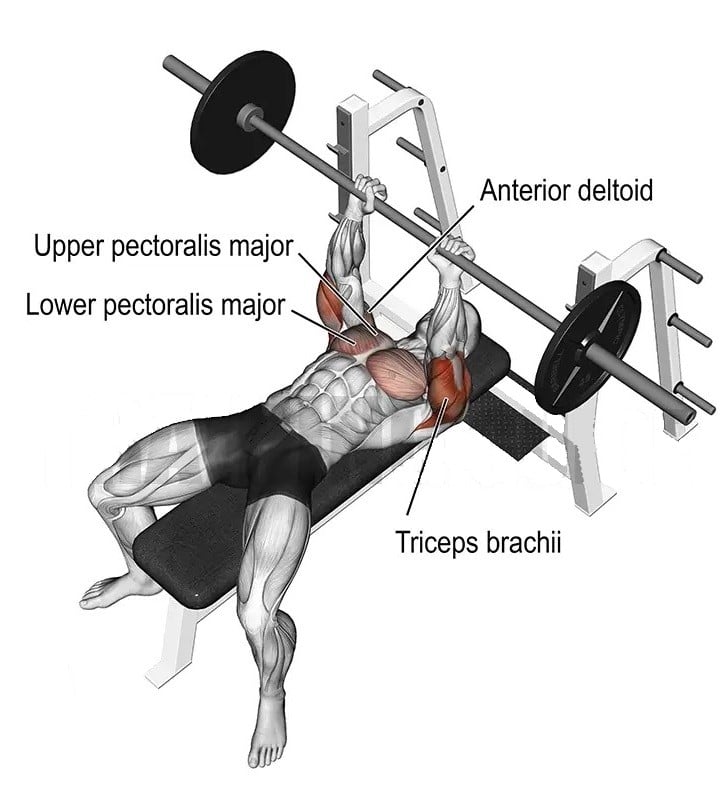
How To Do Close Grip Barbell Bench Press
- Lie flat on your back on the bench. Plant your feet firmly on the floor. They should remain grounded throughout the entire lift to provide a stable base and generate leg drive.
- Reach up and grasp the barbell with a pronated (overhand) grip. Your hands should be closer together than your standard bench press grip.
- Grip the bar width that is approximately shoulder-width apart, or slightly narrower – no more than one hand width inside shoulder width on each side. Avoid gripping too narrowly, as this can place excessive stress on your wrists and elbows.
- Before unracking, retract your shoulder blades by squeezing them together and slightly depressing them (pulling them down towards your hips).
- Maintain a tight upper back position and a slight, natural arch in your lower back throughout the lift.
- Take a deep breath, brace your core, and with your elbows locked, unrack the bar from the supports. Slowly move the bar forward so it is positioned directly over your chest.
- Lower the bar slowly and under control. Actively tuck your elbows towards your sides. They should track downwards at an angle of roughly 45 degrees relative to your torso.
- Lightly touch the bar to your chest.
- Exhale forcefully as you press the bar back up towards the starting position.
- The bar should travel back up in a slight arc, returning to the position directly over your shoulders where you unracked it.
- Once you’ve completed your set, carefully return the bar to the rack.
- Do 8–12 reps for muscle growth.
Know More Body Fat %: Use Our Free Body Fat Calculator
Tips And Form
- Always do a general warm-up followed by specific warm-up sets with lighter weights to prepare your joints and practice the movement pattern.
- Maintain a natural arch in your lower back, but don’t exaggerate it. Your head, upper back, and buttocks should remain in contact with the bench.
- Take a deep breath and hold it (or use the Valsalva manoeuvre) during the descent and until you pass the sticking point on the ascent. Exhale as you finish the press.
- Ensure the grip is tight and the wrists are straight.
- Keep your elbows at about a 45-degree angle relative to your torso. Avoid flaring the elbows out excessively or tucking them too close to your body.
- Do a full range of motion. Lower the barbell until it is close to your chest. Press it back up to full arm extension without locking out the elbows.
- Ensure smooth and controlled motion to prevent unnecessary strain on your joints.
- Focus on creating a Mind-Muscle Connection. Squeezing and contracting the muscles as you press up enhances muscle activation.
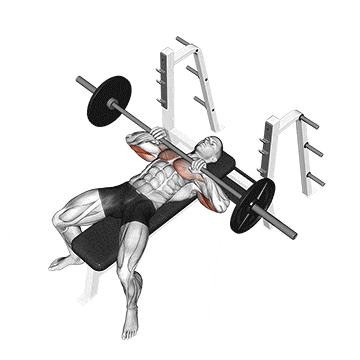
Sets And Reps
The number of sets per week is based on your fitness level. The number of sets per week for a beginner is less than that for an advanced.
However, the number of reps depends on the goals you want to achieve, such as building muscle strength and boosting endurance.
- For muscle building, use a moderately heavy weight.
- For strength building, choose a heavier weight that makes the last rep of each set very challenging.
- For endurance training, pick a light to moderate weight that can do 15–20 reps.
| Goal | Sets | Reps | Rest (sec b/w sets) |
| Strength Building | 3-5 | 4-6 | 90-120 |
| Muscle Building (Hypertrophy) | 3-4 | 8-12 | 60-90 |
| Endurance and Toning | 2-3 | 12-20 | 30-60 |
| General Fitness or Maintenance | 3 | 8-10 | 60-90 |
To Stay Motivated: 150+ Gym Workout Motivational Quotes To Stay Fit
Best Variations Of Close-Grip Chest Press
The close-grip barbell press can be done in different ways to suit your fitness level and your choice.
If you are new to performing a close-grip bench press, you may want to modify the exercise a bit. One way is to use a lighter weight.
If you want to work different muscle fibres in the chest, try incline and decline close-grip barbell presses. You can make it more difficult by using heavier weights. But focus on form while doing the same.
1. Incline Close-Grip Bench Press
Incline close-grip bench press varation, the bench is set to an incline, usually between 15 and 45 degrees.
This exercise combines the benefits of close-grip bench presses for working the tricep muscles with the benefits of incline bench exercises for working the upper chest muscles.
You can also use the EZ bar, which is more comfortable for some people because it has an angled grip.
I like using an EZ bar to do close-grip bench exercises. It helps me gain muscle without hurting my wrist.
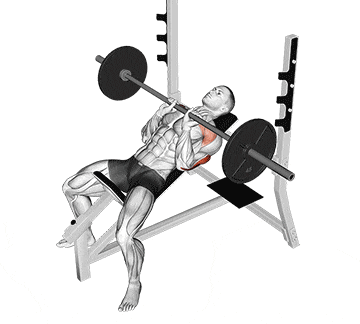
How To Do
- Lie on an incline bench set to around 30–45 degrees.
- Grab the barbell with a close grip that is shoulder-width apart or slightly narrower.
- Keep your elbows tucked in rather than flaring them out.
- Inhale and lower the barbell towards your upper chest.
- Repeat 8–10 reps and 3–4 sets.
2. Decline Close-Grip Bench Press
The bench is set at a decline angle in this variation, typically between 15 and 30 degrees.
This exercise targets the lower part of the chest while still emphasising the triceps, similar to the standard close-grip bench press.
The decline position is easier on the shoulders, so it’s a good choice for people with shoulder problems.
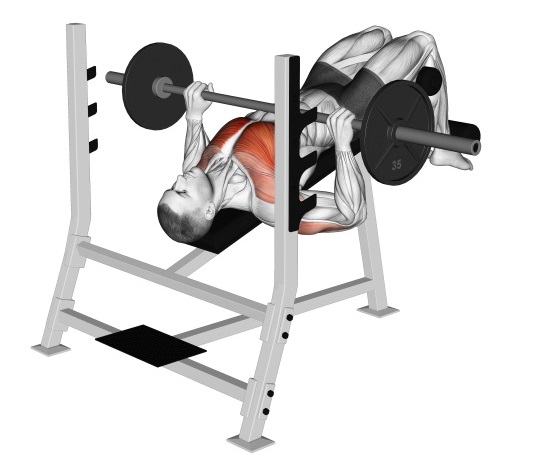
How To Do
- Adjust the decline bench to a 15-30 degree angle (more decline = greater lower chest emphasis).
- Lie flat on a decline bench and hook your feet underneath the pad
- Grip the barbell with a close grip, around shoulder-width.
- Unrack the bar and hold it directly above your chest.
- Inhale and lower the bar slowly to your lower chest.
- Exhale and press the bar back up to the starting position.
References
- Muyor JM, Rodríguez-Ridao D, Oliva-Lozano JM. Comparison of Muscle Activity between the Horizontal Bench Press and the Seated Chest Press Exercises Using Several Grips. J Hum Kinet. 2023 Apr;87:23-34. Published online 2023 Apr 20. doi: 10.5114/jhk/161468.
- Lockie, Robert & Moreno, Matthew. (2017). The Close-Grip Bench Press. Strength and Conditioning Journal. 39. 1. 10.1519/SSC.0000000000000307.
- Barnett, C., Kippers, V., & Turner, P. (1995). Effects of variation on the bench press exercise on the EMG activity of five shoulder muscles. Journal of Strength and Conditioning Research, 9(4), 222–227.

Manish is a NASM-certified fitness and nutrition coach with over 10 years of experience in weight lifting and fat loss fitness coaching. He specializes in gym-based training and has a lot of knowledge about exercise, lifting technique, biomechanics, and more.
Through “Fit Life Regime,” he generously shares the insights he’s gained over a decade in the field. His goal is to equip others with the knowledge to start their own fitness journey.
